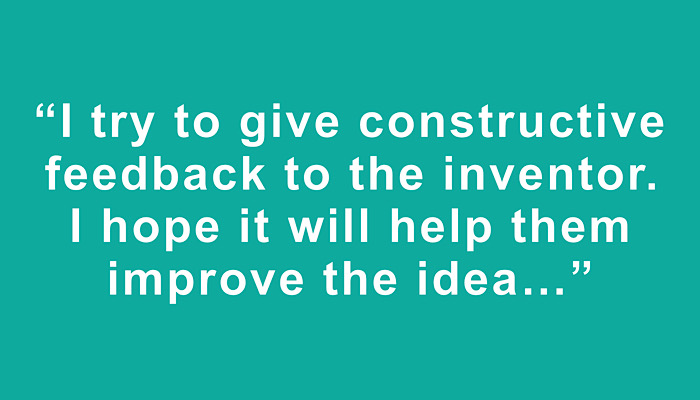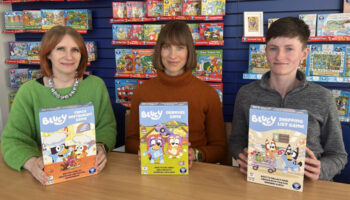If you love something, let it go: Dominique Roy discusses when inventors should give up on ideas

Always a pleasure to tie in, Dominique. I was delighted when you suggested we discuss this subject… When should inventors give up an idea? Why is it on your mind?
It wasn’t my idea. I surveyed a couple of inventors to know what subject they’d like to read about. It was one of the proposed topics, and I felt it’s one that’s easily overlooked.
It’s inspired!
I’m pleased you like it. We all love a good comeback story, don’t we? This subject is pretty much the opposite, but I do wonder about the missed opportunities when ‘dreams’ are followed too blindly.
So what’s the main reason, do you think, that some people keep pushing an idea that isn’t likely to go anywhere?
We naturally promote our own ideas with a disproportionate level of faith. I do it myself – and I think it’s a beneficial thing for the survival of my good and not- so-good ideas. It’s a bit like babies for their parents. Humans have an inherent predisposition to believe their babies are beautiful… Now, for the record – and to help prove my point – my own babies were ridiculously beautiful!
Yes, of course!
But more seriously, it may have to do with a lack of knowledge about the toy industry and more specifically the commercial aspects of it. We’ve all played with toys, so we have a good idea of what a fun one should be. To predict if a toy will sell, however, is a way more delicate exercise. I’ll also add to that… I think we may give too much weight to the originality of an idea.
“Too much weight to the originality of an idea…” That’s interesting. How so?
If you look at the market, you’ll see some very successful toys aren’t really that innovative, but they humbly fill an authentic need. Others are simply very well designed! Obviously, if a company is willing to spend millions to launch a product, it’s better to be inventive to the point of being patentable.

It’s very interesting to me because some new inventors – completely new, I mean – will say to me: “I’ve looked around the shops and there’s absolutely nothing like my idea in stores…” As soon as I hear that, I know they’re going to show me something mind-blowingly original… Or something quite ghastly; something no store would ever touch. Either way, their belief in it is usually unshakeable. So how would an inventor know if they’re too attached to an idea? What are the signs that an idea isn’t going to make it?
That’s a difficult question to answer, but the simplest answer is once you get enough rejection…
At pitches?
Yes, at pitches to professionals. I presume each time an idea is presented, inventors get comments that they then try to integrate in an improved version. At some point, though, you should feel the idea isn’t evolving anymore, or you’ve started to pitch to companies that are really not a good fit. At that point, it may be time to let it go. More positively, it may be a question of timing – and it would be wise to give it a rest. You also need to put things in perspective: the vast majority of ideas won’t make it. So, once an idea steals too much of your attention without any payoff, move to next one.
That’s good advice. In terms of the feedback, though, might part of the problem be that inventor relations execs can be – understandably – somewhat reticent in a meeting? By which I mean very few of them are going to say: “This is awful! Just drop it in a bin.”
Ha! You’re right, it requires quite a large dose of nerve to say that to anyone! I don’t have the guts to say that – not only due to compassion… My own judgment is imperfect… My lack of faith for an idea may come from me not looking at it from the right angle. Very rarely an idea is perfectly aligned with a company’s needs, but the vast majority of them include at a least a kernel that has some merit and can be leveraged.
So you’re saying your own judgement can be flawed? But that you can usually see whether or not the essence of an idea could be made to work for you?
Exactly. And when I intuitively know an idea is – to use a euphemism – “not for us”, I try to give constructive feedback to the inventor. I hope it will help them improve the idea and ultimately find a place for it, even at the risk of ending in the competition’s hands. I believe the payback may come later, and they may think about Make it Real first when they may have a great idea.

In your experience, then, what’s the best way to take your ego out of a project, but still care enough about it to feel passionate?
Hmmm, very good question. I do try to assess my own ideas as coldly as possible by removing most of the emotional aspects from the equation. I apply some filters, each with different weight, to help determine if an idea has potential or – more often – highlight a weakness.
Can you give us an example of that? Of these filters?
To name a few, we search for ideas that bring some true benefits to the user. As product designers, we have a responsibility to create honest products and not abuse from the material resource the so called ‘smoke-and-mirror effect’.
Do you mean – with a craft toy – not overpromise? By which I mean: you want to create products that really do help your customers craft something worthwhile?
Yes. So I always ask myself if a product would truly be useful… Will it really help to craft end results better or faster? Or help you make something that would be impossible to create otherwise?
This is at the core of Make it Real’s brand promises. We also favour concepts based on proven play patterns so it’s marketable without massive marketing support. Oh! And since we’re selling activity-based toys, we give special attention to cool and trendy end results. Both the destination and the journey, from a play experience point of view, need to be appealing for kids.
Fantastic. It’s also worth saying, Dominique, that you’ve spoken with us before – so people can find out more about the way you think here. To round things off, what other questions could I have asked you about this today?
I think we’ve covered everything… But since I talked about my kids in the interview, you may be wondering if they were a good idea…
Ha! I wouldn’t presume to! But go on…
Well, I can tell you: they’re both in their twenties now – and I can proudly say YES – because they became superb human beings!
Oh, wow. What a lovely note to end on. Thank you, Dominique.
–
To stay in the loop with the latest news, interviews and features from the world of toy and game design, sign up to our weekly newsletter here



























